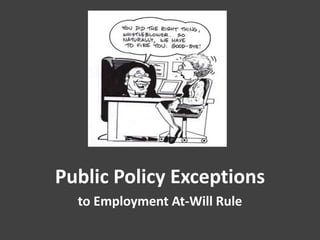
PPE to At-Will Employment in Pennsylvania
- 1. Public Policy Exceptions to Employment At-Will Rule
- 2. Employees who are not hired for a fixed term or under a contract are EMPLOYEES AT-WILL…
- 3. who can be fired…
- 4. for good reason, bad reason, or no reason at all.
- 5. HOWEVER…
- 6. Many states have created exceptions to the employment at-will rule.
- 7. But the exceptions are narrow: STATUTORY JUDGE-MADE
- 8. Judge-Made Exceptions • Derived from state common law • (3) Major Categories: – Implied (in fact) Contract Exception (ICE) – Implied (in law) Covenant of Good Faith and Fair Dealing Exception (CGFFD) – Public Policy Exception (PPE)
- 9. PPE DOCTRINE If termination of an at-will employment relationship violates a clear mandate of public policy, an employee may have a cause of action against his employer for wrongful discharge. Geary v. U.S. Steel Corp., 456 Pa. 171, 185 (1974)
- 10. As of October 2000, forty-three states (and the District of Columbia) recognize a public policy exception to the employment at-will rule. The 7 states which do not have the exception are: – Alabama – Georgia – Louisiana – Maine – Nebraska – New York – Rhode Island – Florida Source: http://www.bls.gov/opub/mlr/2001/01/art1full.pdf
- 11. SOURCES OF “CLEARLY MANDATED” PUBLIC POLICY • Statutes (state & federal) • Constitution (state & federal) • Broader Notions of Public Good & Civic Duty
- 12. So When Has a Discharge of an EE Violated Public Policy???
- 14. TAKE-AWAY An employee may have a cause of action if he is discharged in retaliation for: 1. Refusing to commit a crime 2. Whistleblowing 3. Asserting a legal right or privilege
- 15. Although criminal statutes will almost always embody a clear mandate of public policy, not all whistleblowing and assertions of legal rights/privileges will meet the “clearly mandated” threshold.
- 16. WHISTLEBLOWING
- 17. Cost ↔ Benefit Analysis FACTORS: 1. benefit of warning public 2. cost of undue disparagement to Employer 3. importance of message 4. manner of reporting
- 18. But even when the benefit of warning the public is high, a court may decide that the manner of reporting overrides important policy considerations.
- 19. Just ask George Geary…
- 20. Geary v. U.S. Steel Corp.
- 21. The Set-Up… U.S. Steel Corp. was selling a new product (tubular casing) that was specifically designed for high pressure use.
- 22. The Problem… The tubes had not been tested adequately and were potentially unsafe…
- 23. The Hero… George Geary, a company salesman, used his “close connect” with the company VP and reported the problematic tubes… …U.S. Steel Corp. ended up withdrawing the product from the market…
- 24. ??????
- 25. NOT EXACTLY…
- 26. YOU’RE FIRED!
- 27. WAIT…
- 28. The Court Speaks… …It may be granted that there are areas of an employee's life in which his employer has no legitimate interest… particularly where some recognized facet of public policy is threatened… But this case does not require us to define in comprehensive fashion the perimeters of this privilege, and we decline to do so…” …We hold only that where the complaint itself discloses a plausible and legitimate reason for terminating an at-will employment relationship and no clear mandate of public policy is violated thereby, an employee at will has no right of action against his employer for wrongful discharge.” Id. at 183-85.
- 29. What Went Wrong… Geary “Whistleblowing” Wasn’t The Problem…
- 30. IT WAS TO WHOM HE BLEW THE WHISTLE…
- 31. The Breakdown… Geary bypassed his immediate supervisors when he reported the problem. Accordingly… “The praiseworthiness of Geary's motives [did] not detract from the company's legitimate interest in preserving its normal operational procedures from disruption.” Id. at 183
- 32. Layman’s Translation---> Follow the chain of command
- 33. Geary Summary 1. Pennsylvania Supreme Court first recognized the potentiality of a non-statutory cause of action for terminating an at-will employee. 2. The wrongful discharge, however, must violate a “clear and compelling” mandate of public policy. 3. In a “whistleblower” situation, the employee’s manner of reporting the wrongdoing must be balanced against an employer’s “legitimate interest in preserving [the company’s] normal operational procedures from disruption.”
- 34. Recognized PPE Cases In Pennsylvania, at-will employees cannot be discharged in retaliation for: 1. Filing Workers’ Compensation Claim 2. Filing Unemployment Benefits Claim 3. Refusing to submit polygraph test Rothrock v. Rothrock Motor Sales, Inc., 584 Pa. 297, 299 fn 1 (2005)
- 35. SO FAR.